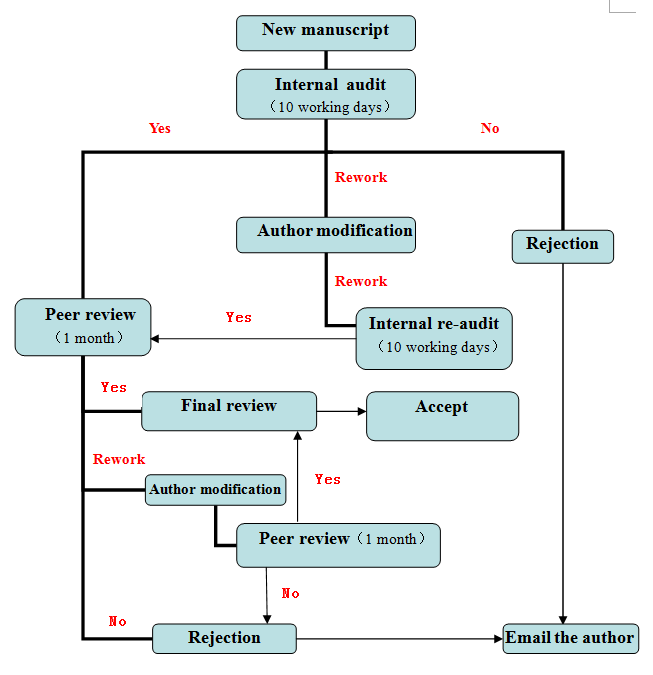Surface technology adopts the review process of internal review, peer review and final review. In order to serious academic style and prevent academic misconduct, and effectively improve the academic quality of the journal, during the review process, reviewers and editors are required to strictly abide by this review specification.
1. Ethics
 The reviewers must abide by the following ethics:
The reviewers must abide by the following ethics:
1) Reviewers must review each manuscript fairly and objectively, and should give the final review results based on the value and quality of the manuscript, regardless of the author's race, religion, nationality, gender, seniority, or institutional background.
2) When the reviewers receive the review invitation, they must clarify any potential conflicts of interest with the manuscript, including any relationship with the author, to ensure that there is no prejudice against the manuscript.
3) Reviewers must keep the review process confidential and any information about the manuscript should not be shared with anyone outside the peer review process.
4) Reviewers should make every reasonable effort to review the manuscript and submit the review comments on time. If the review is not possible or the review comments cannot be submitted on time, the editor should be notified in time.
5) Reviewers should give an objective, fair, and effective review opinion based on the value, quality, and journal conditions of the manuscript to help the editor make the final decision and help the author improve the content of the manuscript.
6) Reviewers should determine any substantively similar or duplicate parts of the relevant publications and articles not cited by the author and the published paper, and inform the editor.
7) Reviewers should objectively review the manuscript, and no personal criticism of the author should appear in the review comments.
8) Without the express written consent of the authors, reviewers may not use unpublished materials from the reviewed manuscripts in their research. Relevant information or ideas obtained during the review process must be kept confidential and cannot be used for personal work.
The editors must abide by the following ethics:
1) Editors should evaluate each article objectively and impartially, and judge it according to its value and quality, without having to consider the author's race, religion, nationality, gender, seniority, or institutional background.
2) When the editors believe that the article is not suitable for the reporting direction of the journal, it should directly reject the manuscript without peer review.
3) Editors should ensure that each article is peer-reviewed by at least two experts in the field.
4) Editors must work hard to deal with articles in an efficient and timely manner.
5) Editors must keep the peer review process confidential and information about the article should not be shared with anyone outside the peer review process.
6) Editors must be aware of any potential conflicts of interest with the manuscript, including any relationship with the authors, to ensure that there is no prejudice against the manuscript.
7) Editors must not use unpublished material from the reviewed manuscripts in their own research without the authors’ express written consent.
8) Whenever the editors receive a complaint about the publication's ethical issues, he should immediately take response measures to actively investigate, obtain evidence, and implement. If necessary, corrections, cancellations and other work need to be carried out.
9) For the main content or conclusion of the published article, if there is solid evidence to prove that there is a problem, the editor needs to carry out appropriate errata work.
2. Peer review rules
1) Surface technology adopts double-blind peer review. All manuscripts must be reviewed by two or more experts. If two experts disagree, please invite a third expert to review and arbitrate.
2) Reviewers must comprehensively evaluate the article in terms of the topic selection, research methods, research results, summary and writing level, and data citation, and must consider the originality, novelty, scientificity, importance, interest, expressiveness, and give the final review conclusion. Reviewers must objectively put forward the problems in the article one by one, and make every effort to give suggestions to help the author improve the article.
3) If the reviewer's review comments are too general and broad to specify the specific problems in the article, they can be regarded as invalid review comments.
3. Review time
1) Internal audit: Completed within 10 working days from the date of submission.
2) Peer review: From the date of submission for external review, reviewers should give review comments within 1 month. If the reviewers do not give review comments, the editorial department must contact the reviewers and ask them to give review comments as soon as possible. The review time period for reviewing manuscripts is also carried out according to the above time.
3) Final review: Completed within 5 working days from the date of the author submits the revised manuscript for external review.
4. Review process
